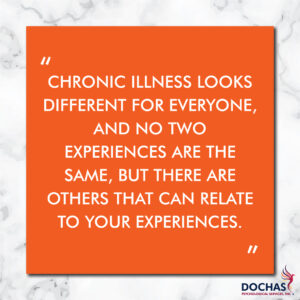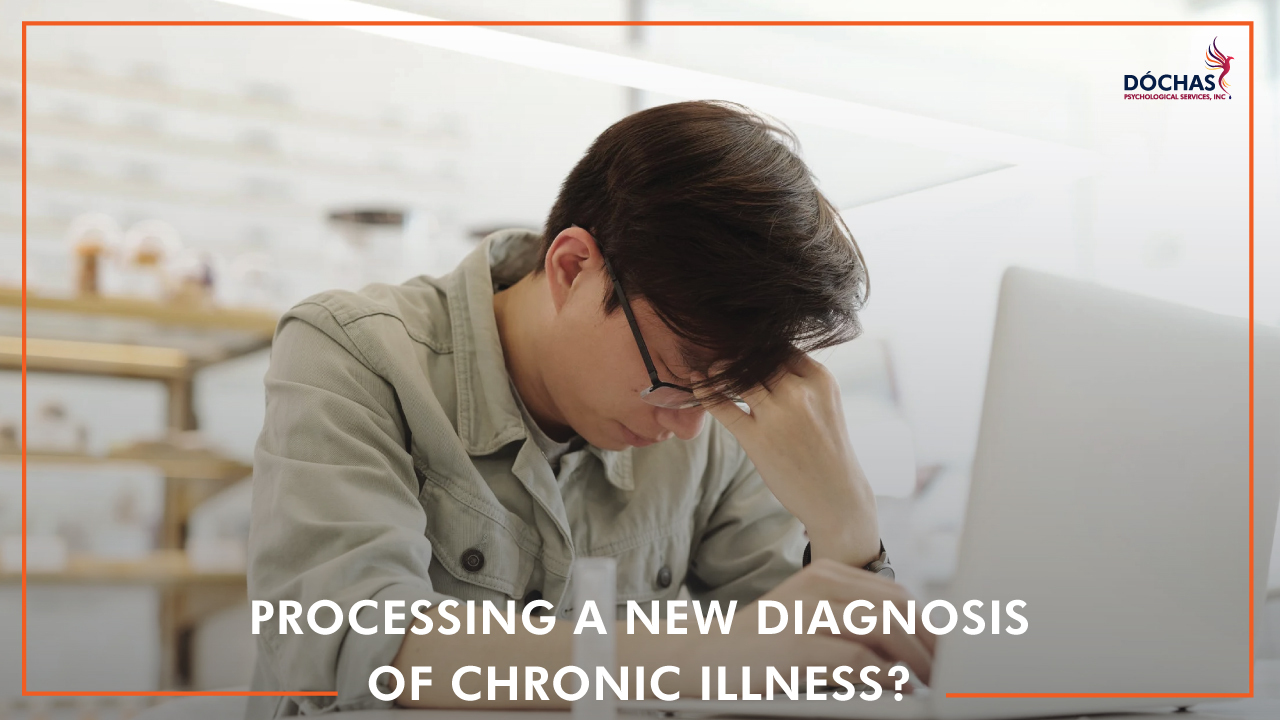Grief is often associated with death, but the experience of loss in any area of life can begin a grieving process. Today it’s Paula here on the Dóchas blog, and I want to talk about the process of grieving after a new diagnosis of a chronic illness.
Chronic illness can mean a variety of things, from diabetes to heart disease to Lyme disease, but no matter what it is, it is considered chronic when it last longer than three months. This means an enormous life change. It’s natural to grieve your “old life”—the way your life used to look prior to your illness or diagnosis. It’s okay to need time to process the rush of emotions that comes with this, emotions such as frustration, fear, shame, or guilt. Physical disease is intimately connected to your mental health. In this blog, I’ll share my experience of going through the five stages of grief after a diagnosis of a chronic illness, and give you some tips.

I was diagnosed with later onset Type 1 diabetes, which is the kind of diabetes typically known as “childhood-onset diabetes.” I never expected to be diagnosed with an illness usually diagnosed in childhood, and beyond the shock of that, I had to face living with a chronic illness that will never go away. The changes it made in my life had to be permanent changes. I took an entire week off after the news, and it took about a week to get out of shock.
It’s important to take time to take information in, without having to make sense of it all. Give yourself permission to feel all the emotions without hurrying yourself to get over them. It takes time to grieve, and time to adjust to the new reality. For me, I had to grieve the loss of a life where I had freedom to eat without consideration of managing my health and preventing complications, and a life where I did not have to be comfortable sitting in uncertainty.
The five stages of grief were so helpful for me in this time. By recognizing I was grieving a loss—a loss of my old life—I could work through my emotions. If you haven’t heard of the five stages of grief before, the stages are: denial, anger, bargaining, depression and acceptance. It’s important to mention that there is no order you “must” go through for these stages, and you might experience one stage more strongly than another. If you don’t experience grief in exactly the same way as I did, that’s okay, because everyone experiences grief differently! But the five stages are a very helpful tool for understanding grief and processing the emotions that come with it.
Denial
Denial is the stage that often comes first, with thoughts such as, maybe it’s a misdiagnosis, maybe the test results are wrong, this can’t be happening to me, and why me? I experienced feelings of shock and second-guessing, and found myself asking, “Did I do something wrong? Who can I blame?” Being in this stage meant emotional dysregulation, anxiety, and lots of tears.
What Can Help
Allow yourself time to sit with each emotion and lean into your supports. Seek out comforts, even the small ones. Talk about the confusion and fear that you may be experiencing. Find kernels of strength, day by day.
Taking it day by day was important for me. Being diagnosed as insulin-dependent meant I was going to be administering needles daily and I was terrified of needles. I relied on my husband for my daily jabs, and I could not fathom self-injecting. I couldn’t envision a future where I would be able to take this on, but at this stage it was important to just allow myself time. I didn’t have to make sense of everything yet. As time went on, I came to accept that this was going to be a regular part of my life and, with practice and support, I conjured the courage to take small steps towards managing the disease by self-injecting. It’s okay to need time to get to this place.
Anger
With time also came anger—the second stage. I was angry that I was “cursed” with a lifelong incurable illness. I was angry that I had to count carbs and take insulin every time I put food in my mouth. Some days I felt like I did not want to do it, and wanted to give up.
What Can Help
In those moments of negative spiralling thoughts, I recognized the source of my frustration and the roots of the emotion of anger. I was angry at the situation; it was not that I was an angry person. It can help to lean into trying to understand the emotion.
I also did not want to be angry for the rest of my life, so I found ways to self-soothe and reregulate- reframing negative thoughts into positive affirmations.
It was helpful to seek out other type 1 diabetics through Instagram and inquire about how they dealt with the frustrations and anger that came with living with chronic illness.
And at times, I allowed myself to be angry—I still do. At times, I roll my eyes when my glucose alarm notifies me of a high blood sugar. I get frustrated, which is a normal and acceptable emotional reaction, although I have learned to accept that it is part of what living with chronic illness is. Let it come, and let it pass. We do what we must to tend to our health, even when we don’t want to or feel like it.
Bargaining
For me, the bargaining stage was a time of introspection. At this stage, there were various “what if” and “if only” thoughts. I started to make deals with myself that I would try my best and take it day by day. I would often say “it could be worse, so I am making the best of my situation.” It was easier to say this out loud, but deep down, I was devastated and embarrassed to inject in public. What would others think? Do I make others uncomfortable? I kept experiencing these thoughts, and that’s when I would think about the “what if.”
What Can Help
The fact of the matter is that there is no one to blame, and nothing that I could have done to prevent this disease. Things happen in life that cannot be explained and at some point, contemplating and bargaining becomes exhausting. When I was in the bargaining stage, I looped for days trying to answer “what if” questions, and I took the onus of responsibility as if I had done something to end up with this disease. This was very contrary to the type of person I was before.
When I recognized that such thinking styles were not serving me, I again sought support. I looked for others who could relate to such emotions and to my experience. This helped. I also reframed my way of thinking about the disease—instead of a curse, I thought of diabetes as a way to take better care of myself.
Depression
Depression did come as well. I had various low days, when I felt apathetic and unwilling to do what I needed to manage the disease. I often felt like even though my friends and family supported me, they did not really get the struggles. I felt so alone on this illness journey, self-pity and at times, just the lack of energy to care.
What Can Help
The truth of the matter is that I did not like the type of person I was when I was depressed. That’s when the positive reframing and taking smaller steps forward became important.
There was so much emphasis on managing the illness, it was exhausting. So instead I reframed my approach and went back to the basics: establishing a good sleep routine, moving my body, drinking more water and anything small that I could do to feel better, even for a few hours. I established practices to tend to those low days, and it’s the basics that I come back to when I am down in the dumps.
Acceptance
Acceptance is the final stage. In my journey, it’s been just over two years since my diagnosis. Diabetes is not going away. I often take time to reflect on how far I have come in learning and coming to terms with understanding living with chronic illness. I would not wish this on anyone, although I have come to terms with having to live with it. The goal now is to focus on letting go of the old way of living, thinking and being—life before glucose monitoring, insulin dosages, carb counting and needles.
Acceptance is important. There is no cure. Nor is there a formula to get to this stage—you must allow yourself to grieve and to go through the stages. Chronic illness looks different for everyone, and no two experiences are the same, but there are others that can relate to your experiences. I can’t tell you exactly how this process may look for you, but I hope that by sharing my experience you can understand how someone with a similar experience to yours has walked through these stages and processed her emotions.
If you are struggling with or stuck in any of these stages, seek out support. Talk about it. These feelings are normal. They are hard. Living with chronic illness is yet another example of your resilience.

If you need professional help as you process a new diagnosis of chronic illness, reach out to us here at Dóchas Psychological Services. You can reach us by email at info@dochaspsych.com, or by phone at 780 446 0300. Take care of yourself!
About Dóchas Psychological
Dóchas Psychological Services is a well-established and trusted therapy clinic located in Spruce Grove, Alberta. At Dóchas we value the idea that everyone deserves a safe space. Through connection and education, our team works hard to build a trustworthy relationship with each of our clients. It is our goal to create a community for our clients to feel like they belong.
Disclaimer
Information provided through Dóchas Psychological Services blogs or vlogs is meant for educational purposes only. They are NOT medical or mental health advice. You can read more about our disclaimer here.









